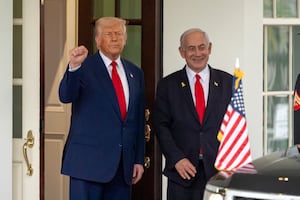US air strikes on Iran’s nuclear facilities have strengthened Tehran's desire to become more secretive about its activities and sideline the UN's atomic watchdog, experts said on Thursday.
President Donald Trump said his administration “successfully” struck three nuclear sites – Fordow, Natanz, and Isfahan – in Iran on Sunday, although the extent of the damage remains unclear. The attacks followed Israeli strikes across Iran aimed at destroying its nuclear capabilities over 12 days.
Iran retaliated by striking key areas in Israel, while blaming the International Atomic Energy Agency for fuelling unease about its nuclear activities. An Iranian bill to suspend co-operation with the IAEA moved closer to passage on Thursday.
A ceasefire was agreed upon early on Tuesday, ending the exchanges that killed hundreds of people and caused extensive damage. However, questions remain on how badly Iran's nuclear activities have been set back.
“Air strikes haven't destroyed all of Iran's nuclear programme, and if anything, they have reinvigorated a desire to be more secretive on their nuclear programme,” said Dina Esfandiary, a Middle East expert at Bloomberg Geoeconomics.
“That’s not to say that they're going to dash for the bomb, but many people in Iran are calling for that,” she told The National.
A leaked US Defence Intelligence Agency assessment has suggested the core components of Iran's nuclear programme have not been destroyed and the strikes only set back Iran's efforts by months rather than years.
But that is only an initial assessment, and is labelled as “low confidence” because it is early in the process of trying to understand what happened.
On June 13. Israel attacked Iranian nuclear facilities and targeted top military commanders and scientists. More than a dozen were killed. That was followed by the US attack that hit the nuclear sites with “bunker-buster” bombs.
“Despite the elimination of senior defence figures and nuclear experts, the regime still possesses the technical expertise necessary to develop a nuclear weapon,” Sanam Vakil, director of the Middle East programme at London’s Chatham House, said.
She said it is likely that “Iran relocated sensitive nuclear materials from prominent locations such as the Fordow facility before the assault. The scope of the damage remains uncertain.”
“Therefore, a long-term resolution to the nuclear challenge will ultimately require a diplomatic approach,” Ms Vakil told The National.

Iranian hostility towards IAEA
The UN watchdog is requesting access to some of Iran's major nuclear facilities now that the war is over, but it is highly unlikely that Tehran will allow it, Ms Esfandiary said.
IAEA inspectors have remained in Iran throughout the conflict and are ready to start work as soon as possible, going back to the country’s nuclear sites and verifying the inventories of nuclear material, the agency's director Rafael Grossi said.
Iran's parliament approved a bill on Wednesday to suspend co-operation with the IAEA.
The decision was approved on Thursday by the Guardian Council, a panel of clerics and jurists that vets legislation. The National has contacted the IAEA for a comment.
“Iran is taking a hostile posture towards the IAEA with its vote in parliament as a prelude to negotiations,” Ms Vakil said.
Iran has long denied any intention of building a nuclear bomb and it insists its nuclear programme is for peaceful purposes.
“The Iran-Israel war has further negatively affected Iran's relationship with the IAEA,” Farzan Sabet, managing researcher at the Geneva Graduate Institute, said. “Tehran historically has had its suspicions of the IAEA and raised questions about its impartiality.
“Tehran will be suspicious about the extent to which the IAEA was used both by the Americans, the Israelis and other western intelligence to infiltrate its nuclear programme and gain knowledge that was then used to conduct strikes on Iranian facilities,” Mr Sabet told The National.
Before the Israeli strikes, the IAEA board had passed a resolution declaring that Tehran was breaching its non-proliferation obligations, which triggered objections from Iran. Since the start of the war, Iranian officials have criticised the agency for failing to condemn the Israeli attacks.



